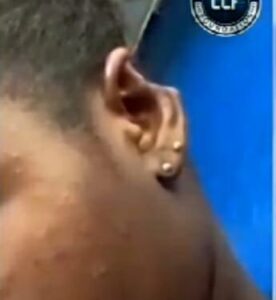Demystifying the myth about breast sucking in reducing the rik of breast cancer
During one of Meena Breast Cancer Foundation’s (MBCF) school outreach, students of St. Mary’s Senior High School in Accra clamored when the Head of the Chemotherapy Department, Eric Brobbey at the Korle-Bu Teaching Hospital educated them on the role breast sucking and breastfeeding play in preventing breast cancer.
Mr. Brobbey mentioned among other measures to prevent cancer that breastfeeding was crucial.
This generated a clamour for the cheering students to state their misguided opinion of belief that they should allow their boyfriends or male partners to suck and fondle their breasts.
It was an opportunity to demystify the age-old myth.
Breastfeeding and breast sucking are distinct activities with different implications for breast health and the risk of developing breast cancer.
While breastfeeding has been associated with a reduced risk of breast cancer, the idea that breast sucking by adults has a significant impact on diminishing the risk of this disease is a myth that has been debunked by oncologists.
Breastfeeding is a natural and beneficial practice for both infants and mothers.
Numerous studies, including the one conducted by Cancer Research in the UK, have shown that breastfeeding can indeed reduce the risk of developing breast cancer.
The mechanism behind this reduction in risk is thought to be related to hormonal changes that occur during lactation.
Specifically, breastfeeding can delay the return of menstruation, which reduces a woman’s lifetime exposure to estrogen, a hormone that can promote the growth of certain breast cancer cells.
However, it is important to emphasize that while breastfeeding can lower the risk of breast cancer, it does not eliminate the risk entirely.
Many factors contribute to an individual’s risk of developing breast cancer, including genetics, family history, and lifestyle factors.
Breast cancer is a complex disease with multiple risk factors, and no single action, such as breastfeeding, can guarantee complete protection.
On the other hand, the idea that adult breast sucking can significantly impact breast cancer risk is not supported by scientific evidence.
Breast sucking, whether for sexual pleasure or any other reason, is fundamentally different from breastfeeding in terms of hormonal and physiological processes involved.
It is a misconception to suggest that such activities have a meaningful effect on breast cancer risk reduction.
In conclusion, breastfeeding is a well-established factor that can modestly reduce the risk of breast cancer.
However, this reduction is not absolute, and other factors also play a crucial role in determining an individual’s risk of developing the disease.
On the contrary, the practice of breast sucking among adults has no significant impact on diminishing breast cancer risk, and it is essential to rely on evidence-based information and consult with healthcare professionals for accurate guidance on breast cancer prevention and risk reduction.
Meena Breast Cancer Foundation (MBCF) has engaged many institutions including schools, and religious and corporate organizations.
St. Mary’s Senior High School is the second second-cycle institution, which has benefited from the MBCF sensitization and free screening for breast cancer.
The Executive Director of Crime Check Foundation (CCF), Ibrahim Oppong Kwarteng who also leads the MBCF encouraged the students to report immediately any abnormalities they find with their breasts and not to shy away from opening up.
“It is time we do not shield problems affecting mankind and society. That is why we are embarking on this exercise to educate you on breast cancer. You have to come out boldly if you realize the signs of the disease so that you can get early treatment. Do not think it is meant for only older people,” Mr. Kwarteng said.
The Head of the Korle-Bu Teaching Hospital’s Chemotherapy Department of the Breast Cancer Unit, Eric Brobbey urged the students to educate their parents on the disease.
Mr. Brobbey who took the students through some causes and preventive measures of breast cancer urged them not to panic when they realized some of the signs but to seek early treatment to save their breasts from being severed.
“If you come early, you will take your breast home but if you delay you will go without the breast,” he said.
A team from the Korle-Bu Teaching Hospital screened teachers for breast cancer.
Another beneficiary school is the Potsin T.I Ahmadiyya Senior High School.
The school is the first institution to benefit from MBCF’s outreach.
The Foundation aims to embark on an aggressive campaign to offer support to patients to undergo medical treatment.
In what was a very engaging discussion, students were awed by some of the points raised by the nurses. This got them asking critical questions and sharing their thoughts pertaining to their health.
Kwanyako Senior High School in the Central Region also had its share of the sensitization of breast cancer.
Students of the school were taken through breast examination exercises with help from partnering nurses from the Oncology Department of the Korle-Bu Teaching Hospital.
Preceding the awareness programme was a video documentary on the abuse of the rights of prisoners by Crime Check Foundation.
A breast cancer survivor, Joycelyn Yaokuma took her turn to share her experience on how she managed the deadly disease.
The MBCF, which was founded to carry out regular education on breast cancer throughout the year, is targeting young people to inculcate in them the habit of constant screening and early treatment as they grow.




